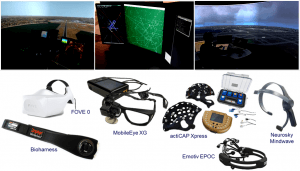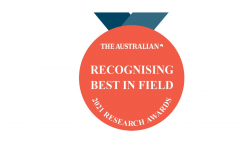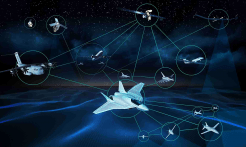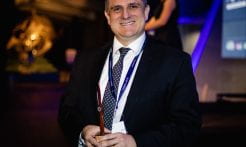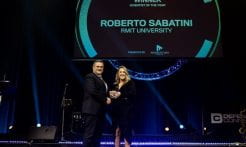Out of more than 60 proposals submitted nation-wide, only 3 professors were selected by Northrop Grumman Mission Systems (NGMS) for this prestigious award. In addition to Prof. Sabatini, Prof. Robert Malaney from the University of New South Wales will be collaborating with Northrop Grumman in quantum communications, while Prof. Tansu Alpcan from the University of Melbourne will be collaborating in cognitive radio systems. The Professorial Scholarships are part of Northrop Grumman’s ongoing commitment to STEM and defence-related research and development activities in Australia.
 The initial grant will be used within the CPAS Group to support research in CHMI2 for Military Aircraft, Command and Control (C2) and Remotely Piloted Aircraft Systems (RPAS), and will allow establishing new collaboration pathways in the area of defence and mission systems (as further detailed here). The national award ceremony was hosted by the Honourable Simon Birmingham, Minister for Education and Training, at the House of Parliament in Canberra on 5th December 2017 (press release by Northrop-Grumman here). An additional celebration was hosted at RMIT University on 6th December and saw the attendance of Prof. Min Gu, Associate Deputy Vice-Chancellor (ADVC) for Research and Innovation (R&I); Prof. Chris McConville, Deputy Pro Vice-Chancellor for R&I in the College of Science, Engineering and Health; Prof. Pier Marzocca, Associate Dean of Engineering (Aerospace Engineering and Aviation) and was attended by a large NGMS delegation led by the Chief Technology Officer (CTO) Eric Reinke.
The initial grant will be used within the CPAS Group to support research in CHMI2 for Military Aircraft, Command and Control (C2) and Remotely Piloted Aircraft Systems (RPAS), and will allow establishing new collaboration pathways in the area of defence and mission systems (as further detailed here). The national award ceremony was hosted by the Honourable Simon Birmingham, Minister for Education and Training, at the House of Parliament in Canberra on 5th December 2017 (press release by Northrop-Grumman here). An additional celebration was hosted at RMIT University on 6th December and saw the attendance of Prof. Min Gu, Associate Deputy Vice-Chancellor (ADVC) for Research and Innovation (R&I); Prof. Chris McConville, Deputy Pro Vice-Chancellor for R&I in the College of Science, Engineering and Health; Prof. Pier Marzocca, Associate Dean of Engineering (Aerospace Engineering and Aviation) and was attended by a large NGMS delegation led by the Chief Technology Officer (CTO) Eric Reinke.
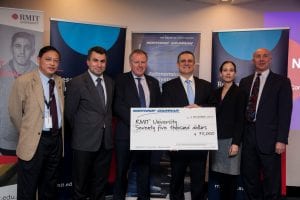
“To achieve maximum real-world impact, academia should be deeply connected to industry and government agencies”, said Prof. Sabatini. “The research in Cognitive Human Machine Interfaces and Interactions hopes to deepen our understanding of human factors engineering by exploring the dependencies between human cognitive and physiological parameters, the different aspects of machine automation, as well as environmental and mission-related factors. The long-term goal is to model and integrate these dependencies into existing and future mission systems to allow effective forms of human-machine teaming, towards delivering the next generation of defence trusted autonomous systems.”
